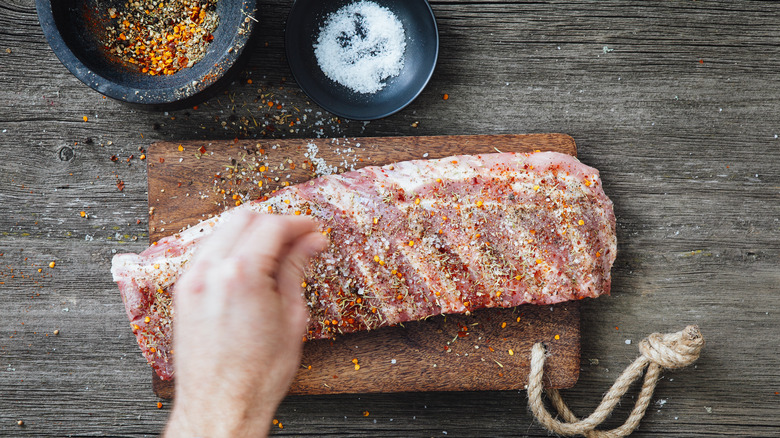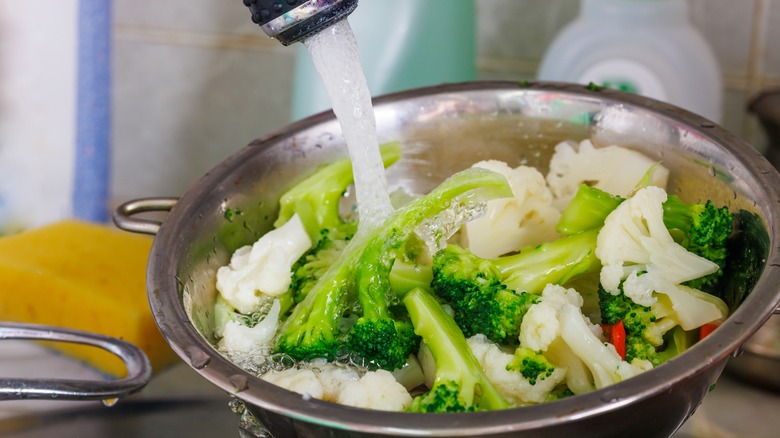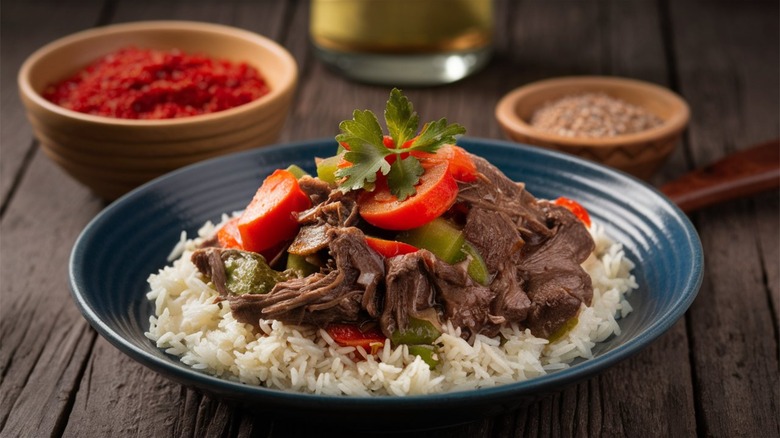Overseason Your Meat Or Veggies Before Cooking? An Expert Offers An Easy Fix
Overseasoning is the culinary specter that haunts even the most accomplished chefs. Considering how important salting and seasoning are to boost the flavors of various ingredients, going too light on them isn't the best option. Of course, it's good to keep a bottle of salt spray in the kitchen for when you want to add an even layer to a cooked dish. However, using salt as a finishing ingredient is not a substitute for salting before and during cooking. And that is doubly true for seasoning.
When working with uncooked ingredients, It's generally a good idea to season frequently. For example, when building a sandwich, you want to season every component instead of relying on condiments to do all the work — that's seasoning the beef, buttering the bun, zinging up the mayo, etc. Adherence to this imperative, however, will make overseasoning more likely, and in cases where you're working with a seasoning brand or a type of salt you're not familiar with, it can be like playing flavor Russian roulette.
While it's best to avoid overseasoning, there are ways to salvage your meat or veggies if they get too much of a certain seasoning before being cooked. In a one-on-one with Chef CJ Jacobson of Aba Miami, we got tips to help tame that excess seasoning and bring things back on track.
Rinse and wipe overseasoned uncooked ingredients
The best way to salvage overseasoned meat and veggies is to simply wash off the excess. "Wipe off the overseasoned ingredient. Rinse and dry the oversalted product," recommends CJ Jacobson. Raw vegetables and meat are the easiest to fix since they haven't absorbed the seasoning yet. However, even if you've started cooking a steak or cut of meat and figured out halfway through that you've gone a little heavy with the seasoning, you can give it a quick rinse, pat it dry, and put it back on the heat.
Since wiping or rinsing off seasoning removes most of it (especially if you do the latter), you may have to re-season. When doing so, use less than you normally would to account for any seasoning that didn't get wiped off and may have adhered to the raw food.
Finally, be familiar with the potency of the salt and seasonings you use. Different types of salt can have varying degrees of concentration. A pinch of coarse salt will not taste as intense as fine salt. If you plan on using more salty additions like Parmesan, anchovies, or soy sauce, you must account for those as well when deciding how heavily to salt and season ingredients.
If all else fails, repurpose overseasoned ingredients into other dishes
Should the worst happen and you are unable to get as much of the seasoning off as you'd like, Jacobson says it's best to take it as a lesson and start over with fresh ingredients. However, you don't have to throw out that overseasoned produce. There's a lot that you can use it for.
One option is to use it in a dish with ingredients that help neutralize the excessive seasoning. Fresh dairy products like cream, mozzarella, and ricotta are great for subduing overpowering flavors. A touch of acidity from lemon or vinegar also helps. Alternatively, you can use your overseasoned ingredient as the base for a dish, and season the rest of it lightly to balance the flavors.
For example, use overseasoned vegetables to make a soup, which you can then dilute with broth and other ingredients. Similarly, overseasoned meat can be used to make a rich stew with added vegetables to mellow out the flavors. If you still find the dish too heavily seasoned, consider pairing it with plain boiled rice. Adding some vinegar to the rice makes it fluffier and also helps balance excess saltiness. Ultimately, even if you overseason, you can still end up with a delicious outcome ... in addition to the hard-won lesson.


